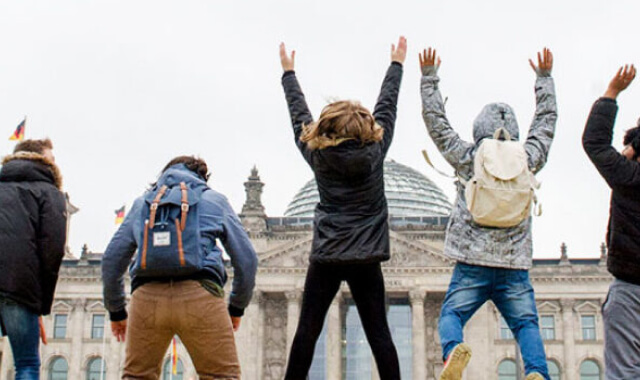Conversation is the Soul of Democracy.
Here are the main initiatives of More Democracy, an organization committed to the further development of democracy in Germany and Europe. It is the largest movement of its kind in the world and can serve as a great example for other countries.
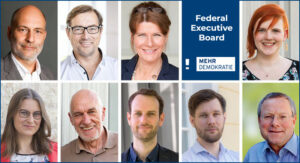
Board of More Democracy
The organization has been working for democratic reforms and greater transparency for decades. Through campaigns, referendums, and discussions with politicians, More Democracy has now expanded to all German states. A current major project is the creation of citizens’ councils, whose participants are chosen by vote. They’re working to develop new forms of communication about political issues.
The Crisis of Democracy
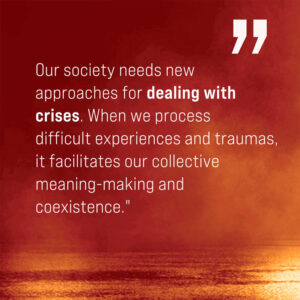 The world around us is divided, which leads to bullying, competition, and polarization. Groups isolate themselves from each other and no longer communicate, unless it’s to disparage one another. People merely surround themselves with their own kind. Those from the left wing and the right wing don’t talk. At the same time, more and more people are becoming isolated. They are inwardly lost and lack emotional support.
The world around us is divided, which leads to bullying, competition, and polarization. Groups isolate themselves from each other and no longer communicate, unless it’s to disparage one another. People merely surround themselves with their own kind. Those from the left wing and the right wing don’t talk. At the same time, more and more people are becoming isolated. They are inwardly lost and lack emotional support.
Meanwhile, the problems are piling up. The effects of the pandemic, climate change, upheavals in the economic and financial system, microplastics in all organisms, species extinction, and environmental pollution have widened the gap between the rich and poor in our societies, and between the Global North and the Global South. On top of that, the war in Ukraine is shaking us to the core and causing our foundations to crumble.
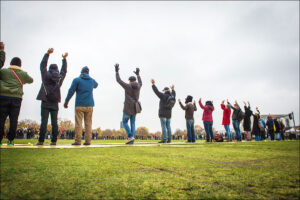 In some parts of the world, even democracy itself is being called into question. Are democratic decision-making processes still adequate to respond quickly and effectively to acute crises, especially climate change? One can also look at it the other way around. A policy that further narrows the ecological horizon endangers democracy.
In some parts of the world, even democracy itself is being called into question. Are democratic decision-making processes still adequate to respond quickly and effectively to acute crises, especially climate change? One can also look at it the other way around. A policy that further narrows the ecological horizon endangers democracy.
“If solutions are postponed today, they will have to be all the more drastic tomorrow. What policymakers fail to do today to meet the Paris climate targets will not be made up for later with incremental policies, but only with brute force. In other words, the failure of today’s policies will be acknowledged tomorrow as an eco-dictatorship. Those who want to escape this must rely on democratic solutions. Courageous climate policy will only succeed with the people.” Roman Huber, More Democracy.
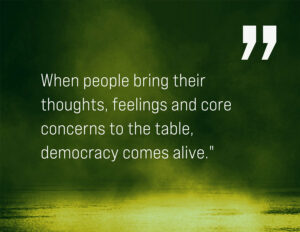 The primary idea of democracy is that everyone must be able to influence decisions that affect them. If this is ignored and concrete climate protection measures come only from those at the top, and alternative solutions are not presented, we risk climate protection as a whole being rejected.
The primary idea of democracy is that everyone must be able to influence decisions that affect them. If this is ignored and concrete climate protection measures come only from those at the top, and alternative solutions are not presented, we risk climate protection as a whole being rejected.
Knowledge, Rationality, Feelings, and Trauma
Time is running. We live in an economic system that must grow out of its internal dynamics just to maintain the status quo, and more is needed to keep this emergency from accelerating. That is why, in the view of More Democracy, more “psychology” is needed in society and in politics. The word “psychology” is derived from the word “psyche”, which was the name of the Greek goddess of the soul. We need more knowledge about the human soul infused in our political landscape.
Democracy depends on being able to include all people.
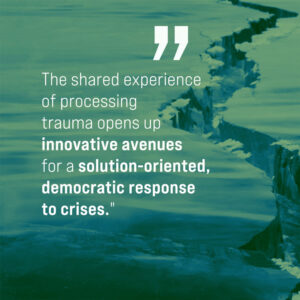 We ourselves are part of the problem, we are not separate from it, and there are no “others” to blame. Instead, we should question ourselves, including our opinion bubbles. Division is not just created out there, but also within and through us.
We ourselves are part of the problem, we are not separate from it, and there are no “others” to blame. Instead, we should question ourselves, including our opinion bubbles. Division is not just created out there, but also within and through us.
In their many years of work, the activists of More Democracy repeatedly came up against invisible limits that they hadn’t predicted. The reasons for this can hardly be explained by the reasoning of conventional politics.
“Political events are determined much less by rationality than we assume. Even our personal beliefs are more irrational than we think. Emotions, not philosophical considerations, shape our values. That is why we include other dimensions of being human. We’re barely aware of the unconscious trauma layer that lies beneath everything. It consists of individual and social trauma structures that affect us all. They influence society as well as politics and have a decisive but invisible share in our crises. Only when we become aware of all influences, including the partly unconscious ones, can a truly innovative dialogue emerge,” says Roman Huber.
This is where the work of More Democracy and the Pocket Project meets.
“No matter how private or personal it may seem, trauma does not belong exclusively to an individual, to a family, nor to a single ancestral line. The consequences of trauma seep into communities, into societies, into entire regions and nations.” says Thomas Hübl.
Working with trauma and collective trauma has been a focus of Thomas’ work for years. This developed organically from intensive work with large groups. When a coherent group space is created in which participants feel accepted and safe, a kind of “detoxification process” begins. Unprocessed conflicts come to the surface, pushing for resolution and healing. This can take on chaotic forms and initially look like a kind of regression in the process, but overall it is a transitory stage to a more conscious state.
Similar processes are taking place across society, as explained in the “The Detox Phase of Democracies” episode of Thomas’ podcast, Point of Relation.
The Online Workshop on Trauma and Democracy
In April 2022, a three-day large group process took place to explore the relationship between collective trauma, social polarization, and democracy. It was organized in cooperation with the Pocket Projekt and More Democracy, led by Thomas Hübl, and brought together more than 350 people.
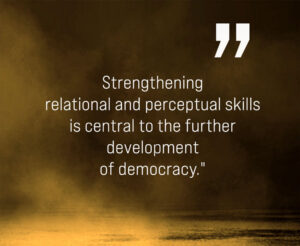 Many of them came from the political sphere and had little experience with inner work. They embarked on an exciting process of self-exploration. Participants worked both in groups of three and individually. Many brave attendees ventured forward and revealed their attitudes and feelings about political issues in front of the group, and began to look deeper into them. Supported by the group, many touching processes unfolded in which it became clear how political attitudes are connected with personal history, injuries, and also traumatic experiences.
Many of them came from the political sphere and had little experience with inner work. They embarked on an exciting process of self-exploration. Participants worked both in groups of three and individually. Many brave attendees ventured forward and revealed their attitudes and feelings about political issues in front of the group, and began to look deeper into them. Supported by the group, many touching processes unfolded in which it became clear how political attitudes are connected with personal history, injuries, and also traumatic experiences.
One participant explained, “In every story there is history, we carry history within us, and because of that we have a voice.”
The Research Report
Experts from the Cynefin Centre, the Institute for Integral Studies, and the Institute for Advanced Sustainability Studies contributed a scientific perspective to the workshop.
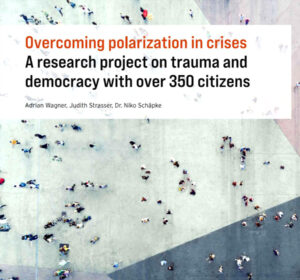 Empirical evidence shows that the participants’ relationship to democracy became more positive in the course of the process. At the beginning of the process, “mixed feelings” of distance and disenchantment with politics predominated their narratives. By the end of the process, confidence in self-efficacy, compassion, and courage to develop democracy became more prominent. Throughout the process, abstract concepts such as politics, participation, and democracy became more concretely tangible and alive for the participants.
Empirical evidence shows that the participants’ relationship to democracy became more positive in the course of the process. At the beginning of the process, “mixed feelings” of distance and disenchantment with politics predominated their narratives. By the end of the process, confidence in self-efficacy, compassion, and courage to develop democracy became more prominent. Throughout the process, abstract concepts such as politics, participation, and democracy became more concretely tangible and alive for the participants.
The experience of a coherent and safe group space in which trauma-informed, respectful, and appreciative communication can be experienced under competent guidance has a very direct positive impact on democracy.
Further results, including research methods, can be found in the research report.
Outlook
The research results indicate that new forms of dialogue and new forms of cooperation in politics and society are helpful in countering the effects of crises in the long term. The prerequisite for this is the will to observe oneself and the ability to tolerate ambiguous situations and contradictory courses of action. Above all, trauma-informed process facilitators are needed who are neutral and independent.
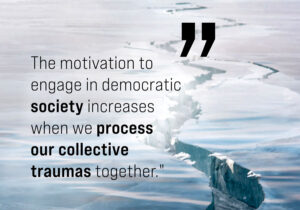 Without personal development, there will be no sustainable social progress. This affects everyone, but especially people in politics and in important social and economic positions. The greater a person’s influence, the more important these competencies are, because a person’s shadows inevitably transfer to his or her sphere of influence.
Without personal development, there will be no sustainable social progress. This affects everyone, but especially people in politics and in important social and economic positions. The greater a person’s influence, the more important these competencies are, because a person’s shadows inevitably transfer to his or her sphere of influence.
More and more, people who consistently do inner work are ready to engage socially. This could help us progress from a polarized society to a cooperative democracy.
Where can you already experience such new spaces of democratic culture?
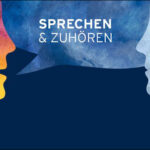 The online format “Speak and Listen” at Mehr Demokratie is open to everyone. It is currently only offered in German. Listening to each other, staying in contact, even if other positions are sometimes difficult to endure – that is the basis for a functioning democracy. More information here (in German) >>
The online format “Speak and Listen” at Mehr Demokratie is open to everyone. It is currently only offered in German. Listening to each other, staying in contact, even if other positions are sometimes difficult to endure – that is the basis for a functioning democracy. More information here (in German) >>
 The Pocket Project’s Global Social Witnessing online calls are open to all. Global Social Witnessing is the human ability to collectively engage with global events with an embodied awareness, thereby creating and reflecting a compassionate inner space that can affect the course of these events. Read more here >>
The Pocket Project’s Global Social Witnessing online calls are open to all. Global Social Witnessing is the human ability to collectively engage with global events with an embodied awareness, thereby creating and reflecting a compassionate inner space that can affect the course of these events. Read more here >>
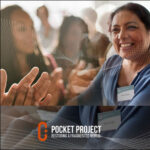 The Pocket Project’s online Community Calls are also open to all. Learning together in community is part of a healthy lifestyle. Our relationships are an essential part of who we are – I am because you are. Read more here >>
The Pocket Project’s online Community Calls are also open to all. Learning together in community is part of a healthy lifestyle. Our relationships are an essential part of who we are – I am because you are. Read more here >>
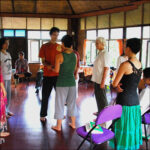 Systemic constellations, including covert ones, on political content take place online in German as a very exciting project by More Democracy. Read more here (in German) >>
Systemic constellations, including covert ones, on political content take place online in German as a very exciting project by More Democracy. Read more here (in German) >>
More info about More Democracy
 More Democracy is a non-profit organization with about 10,000 members and an interested audience of 200,000 people. The core concern is to create more direct democracy, fair voting rights, and more effective citizen participation. The quality of exchange and decision-making in democratic culture is just as important as improving democratic structures. At the same time, the initiative opposes the dismantling of democratic rights, identifies weak points in the political system, and sees itself as a democratic conscience. “More Democracy” is internationally networked and is a founding member of “Democracy International.”
More Democracy is a non-profit organization with about 10,000 members and an interested audience of 200,000 people. The core concern is to create more direct democracy, fair voting rights, and more effective citizen participation. The quality of exchange and decision-making in democratic culture is just as important as improving democratic structures. At the same time, the initiative opposes the dismantling of democratic rights, identifies weak points in the political system, and sees itself as a democratic conscience. “More Democracy” is internationally networked and is a founding member of “Democracy International.”
More Democracy Website in English >>
More info about the Pocket Project
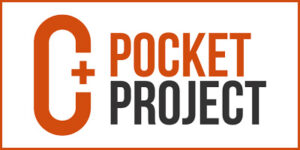 The Pocket Project, co-founded by Thomas Hübl, helps overcome and integrate individual, intergenerational, and collective trauma. The goal is to heal the wounds of the past and thus set humanity on a path of creativity, effective collaboration, and innovation.
The Pocket Project, co-founded by Thomas Hübl, helps overcome and integrate individual, intergenerational, and collective trauma. The goal is to heal the wounds of the past and thus set humanity on a path of creativity, effective collaboration, and innovation.
Pocket Project Website >>
